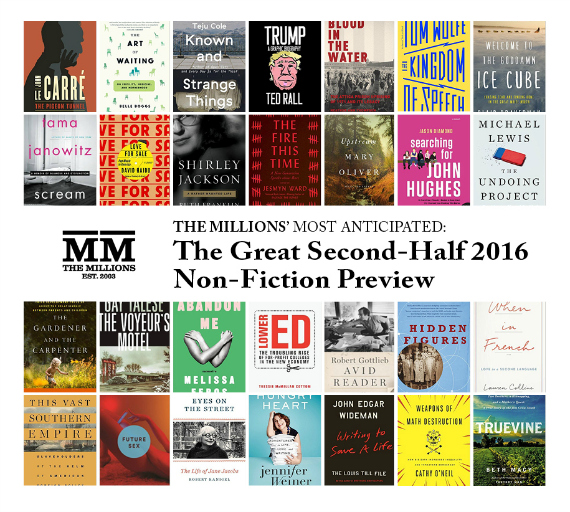
Last week, we previewed 93 works of fiction due out in the second half of 2016. Today, we follow up with 44 nonfiction titles coming out in the next six months, ranging from a new rock memoir by Bruce Springsteen to a biography of one our country’s most underrated writers, Shirley Jackson, by critic Ruth Franklin. Along the way, we profile hotly anticipated titles by Jesmyn Ward, Tom Wolfe, Teju Cole, Jennifer Weiner, Michael Lewis, our own Mark O’Connell, and many more.
Break out the beach umbrellas and the sun block. It’s shaping up to be a very hot summer (and fall!) for new nonfiction.
July:
How to Be a Person in the World by Heather Havrilesky: 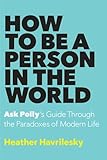 Advice from “Polly,” New York magazine’s online column for the lovelorn, career-confused, adulthood-challenged, and generally angsty. Havrilesky pours her heart into her answers, offering guidance that is equal parts tough love, “I’ve been there,” and curveball. This collection includes new material as well as previously published fan favorites. (Hannah)
Advice from “Polly,” New York magazine’s online column for the lovelorn, career-confused, adulthood-challenged, and generally angsty. Havrilesky pours her heart into her answers, offering guidance that is equal parts tough love, “I’ve been there,” and curveball. This collection includes new material as well as previously published fan favorites. (Hannah)
Trump: A Graphic Biography by Ted Rall: 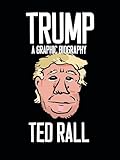 Just in time for the Republican convention, cartoonist Rall follows his recent graphic bios of Sen. Bernie Sanders and CIA whistleblower Edward Snowden with a comic book peek into the life and times of America’s favorite short-fingered vulgarian. Given that Rall once called on Barack Obama to resign, saying the 44th president made “Bill Clinton look like a paragon of integrity and follow-through,” it’s a safe bet that Trump won’t be flogging this one on his campaign website. (Michael)
Just in time for the Republican convention, cartoonist Rall follows his recent graphic bios of Sen. Bernie Sanders and CIA whistleblower Edward Snowden with a comic book peek into the life and times of America’s favorite short-fingered vulgarian. Given that Rall once called on Barack Obama to resign, saying the 44th president made “Bill Clinton look like a paragon of integrity and follow-through,” it’s a safe bet that Trump won’t be flogging this one on his campaign website. (Michael)
Not Pretty Enough by Gerri Hirshey: 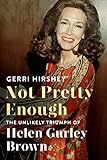 A biography of Helen Gurley Brown, the founder and creator of Cosmopolitan magazine, following Brown from her upbringing in the Ozarks to her freewheeling single years in L.A. to her rise in the New York advertising and magazine world. The “fun, fearless” editor lived large and worked hard, embracing new sexual and economic freedoms and teaching other women to do the same by offering candid advice on sex, love, money, career, and friendship. (Hannah)
A biography of Helen Gurley Brown, the founder and creator of Cosmopolitan magazine, following Brown from her upbringing in the Ozarks to her freewheeling single years in L.A. to her rise in the New York advertising and magazine world. The “fun, fearless” editor lived large and worked hard, embracing new sexual and economic freedoms and teaching other women to do the same by offering candid advice on sex, love, money, career, and friendship. (Hannah)
Bush by Jean Edward Smith:  He did it his way. According to Smith, author of previous bios of Dwight D. Eisenhower and F.D.R., President George W. Bush relied on his religious faith and gut instinct to make key decisions of his presidency, including the fateful order to invade Iraq a year and a half after the 9/11 attacks. Only in the final months of his second term, with the banking system nearing collapse, did the “Decider-in-Chief” pay closer attention to expert advice and take actions that pulled the world economy back from the brink. (Michael)
He did it his way. According to Smith, author of previous bios of Dwight D. Eisenhower and F.D.R., President George W. Bush relied on his religious faith and gut instinct to make key decisions of his presidency, including the fateful order to invade Iraq a year and a half after the 9/11 attacks. Only in the final months of his second term, with the banking system nearing collapse, did the “Decider-in-Chief” pay closer attention to expert advice and take actions that pulled the world economy back from the brink. (Michael)
Welcome to the Goddamn Ice Cube by Blair Braverman: 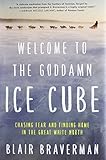 Fans of This American Life might recognize Braverman from Episode 558, “Game Face”, in which Braverman, working as a dog musher, got stuck in a storm on an Alaskan glacier with a group of tourists who had no idea of the danger they were in. Her memoir describes her tendency to court danger as she ventures into the arctic, a landscape that is not only physically exhausting but also a man’s world that doesn’t have much room for a young woman. (Hannah)
Fans of This American Life might recognize Braverman from Episode 558, “Game Face”, in which Braverman, working as a dog musher, got stuck in a storm on an Alaskan glacier with a group of tourists who had no idea of the danger they were in. Her memoir describes her tendency to court danger as she ventures into the arctic, a landscape that is not only physically exhausting but also a man’s world that doesn’t have much room for a young woman. (Hannah)
The Voyeur’s Motel by Gay Talese: 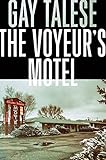 Some questioned Talese’s journalistic ethics when an excerpt from this book was published in The New Yorker in April. Others admired it as an endurance feat of reporting. Talese spent decades corresponding and visiting a voyeuristic motel owner, Gerald Foos, who constructed a motel that allowed him to secretly spy on his guests. After 35 years, Foos agreed to let Talese reveal his identity and lifelong obsession with voyeurism. In the weeks leading up to publication, Talese has admitted that some of the facts in the book are wrong and told The Washington Post that he won’t be promoting it. Then he told the The New York Times he would be promoting it. We don’t know what to make of it all, either. You’ll just have to read the book and decide for yourself. (Hannah)
Some questioned Talese’s journalistic ethics when an excerpt from this book was published in The New Yorker in April. Others admired it as an endurance feat of reporting. Talese spent decades corresponding and visiting a voyeuristic motel owner, Gerald Foos, who constructed a motel that allowed him to secretly spy on his guests. After 35 years, Foos agreed to let Talese reveal his identity and lifelong obsession with voyeurism. In the weeks leading up to publication, Talese has admitted that some of the facts in the book are wrong and told The Washington Post that he won’t be promoting it. Then he told the The New York Times he would be promoting it. We don’t know what to make of it all, either. You’ll just have to read the book and decide for yourself. (Hannah)
Bobby Kennedy by Larry Tye: 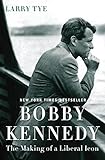 Drawing on interviews, unpublished memoirs, newly released government files, “and fifty-eight boxes of papers that had been under lock and key for the past forty years,” Tye traces Bobby Kennedy’s journey from 1950s cold warrior to 1960s liberal icon following the assassination of his older brother, John, in 1963. In an era when presidential candidates are routinely excoriated for decades-old policy positions, it can be instructive to recall that the would-be savior of the urban poor began his public life just 15 years earlier as counsel to red-baiting Sen. Joseph McCarthy. (Michael)
Drawing on interviews, unpublished memoirs, newly released government files, “and fifty-eight boxes of papers that had been under lock and key for the past forty years,” Tye traces Bobby Kennedy’s journey from 1950s cold warrior to 1960s liberal icon following the assassination of his older brother, John, in 1963. In an era when presidential candidates are routinely excoriated for decades-old policy positions, it can be instructive to recall that the would-be savior of the urban poor began his public life just 15 years earlier as counsel to red-baiting Sen. Joseph McCarthy. (Michael)
August
The Fire This Time edited by Jesmyn Ward: 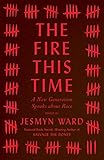 Fifty-three years after James Baldwin’s classic The Fire Next Time, and one year after Ta-Nehisi Coates’s scalding book-length meditation on race, Between the World and Me, Ward has collected 18 essays by some of the country’s foremost thinkers on race in America, including Claudia Rankine, Isabel Wilkerson, and former U.S. Poet Laureate Natasha Trethewey. “To Baldwin’s call we now have a choral response — one that should be read by every one of us committed to the cause of equality and freedom,” says historian Jelani Cobb.
Fifty-three years after James Baldwin’s classic The Fire Next Time, and one year after Ta-Nehisi Coates’s scalding book-length meditation on race, Between the World and Me, Ward has collected 18 essays by some of the country’s foremost thinkers on race in America, including Claudia Rankine, Isabel Wilkerson, and former U.S. Poet Laureate Natasha Trethewey. “To Baldwin’s call we now have a choral response — one that should be read by every one of us committed to the cause of equality and freedom,” says historian Jelani Cobb.
The Gardener and the Carpenter by Alison Gopnik: 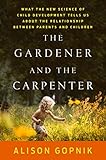 This parenting book takes issue with the culture of “parenting,” a hyper-vigilant, goal-oriented style of childcare that leaves children and caregivers exhausted. Gopnik, a developmental psychologist, and the author of The Philosophical Baby, argues that parents should adopt a looser style, one that is more akin to gardening than building a particular structure. Her metaphor is backed up by years of research and observation. (Hannah)
This parenting book takes issue with the culture of “parenting,” a hyper-vigilant, goal-oriented style of childcare that leaves children and caregivers exhausted. Gopnik, a developmental psychologist, and the author of The Philosophical Baby, argues that parents should adopt a looser style, one that is more akin to gardening than building a particular structure. Her metaphor is backed up by years of research and observation. (Hannah)
Scream by Tama Janowitz: 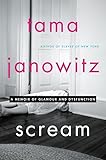 A memoir from the author of Slaves of New York, the acclaimed short story collection about young people trying to make it in downtown Manhattan in the 1980s. Following the publication of Slaves, Janowitz was grouped with the “Brat Pack” writers Bret Easton Ellis and Jay McInerney famed for their deadpan minimalist style. Scream reflects on that time, as well as the more universal life experiences that followed as Janowitz became a wife, mother, and caregiver to her aging mother. (Hannah)
A memoir from the author of Slaves of New York, the acclaimed short story collection about young people trying to make it in downtown Manhattan in the 1980s. Following the publication of Slaves, Janowitz was grouped with the “Brat Pack” writers Bret Easton Ellis and Jay McInerney famed for their deadpan minimalist style. Scream reflects on that time, as well as the more universal life experiences that followed as Janowitz became a wife, mother, and caregiver to her aging mother. (Hannah)
American Heiress by Jeffrey Toobin: 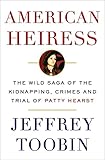 As the author of The Run of His Life, about the O.J. Simpson murder trial, and A Vast Conspiracy, about the Bill Clinton-Monica Lewinsky sex scandal, Toobin is no stranger to tabloid-drenched legal sagas, which makes him an ideal guide to the media circus surrounding Patty Hearst’s 1974 kidnapping and later trial for bank robbery. Drawing on interviews and a trove of previously unreleased records, Toobin, a New Yorker staff writer, tries to make sense of one of the weirdest and most violent episodes in recent American history. (Michael)
As the author of The Run of His Life, about the O.J. Simpson murder trial, and A Vast Conspiracy, about the Bill Clinton-Monica Lewinsky sex scandal, Toobin is no stranger to tabloid-drenched legal sagas, which makes him an ideal guide to the media circus surrounding Patty Hearst’s 1974 kidnapping and later trial for bank robbery. Drawing on interviews and a trove of previously unreleased records, Toobin, a New Yorker staff writer, tries to make sense of one of the weirdest and most violent episodes in recent American history. (Michael)
The Kingdom of Speech by Tom Wolfe: 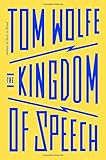 The maximalist novelist returns to his nonfiction roots with a book that argues speech is what divides humans from animals, above all else. (Tell that to Dr. Dolittle!) Wolfe delves into controversial debates about what role speech has played in our evolution as a technological species. For a sneak preview of his arguments, check out his 2006 NEA lecture, “The Human Beast”. (Hannah)
The maximalist novelist returns to his nonfiction roots with a book that argues speech is what divides humans from animals, above all else. (Tell that to Dr. Dolittle!) Wolfe delves into controversial debates about what role speech has played in our evolution as a technological species. For a sneak preview of his arguments, check out his 2006 NEA lecture, “The Human Beast”. (Hannah)
Blood in the Water by Heather Ann Thompson:  Anyone needing to be reminded that the problems in America’s prison system date back to long before the War on Drugs may want to pick up Thompson’s history of the infamous 1971 Attica prison uprising. After 1,300 prisoners seized control of the upstate New York prison, holding guards and other employees hostage for four days, the state sent in troopers to take the prison back by force, leaving 39 people dead and 100 more severely injured. Thompson has drawn on newly unearthed documents and interviews with participants from all sides of the debacle to create what is being billed the “first definitive account” of the uprising 45 years ago. (Michael)
Anyone needing to be reminded that the problems in America’s prison system date back to long before the War on Drugs may want to pick up Thompson’s history of the infamous 1971 Attica prison uprising. After 1,300 prisoners seized control of the upstate New York prison, holding guards and other employees hostage for four days, the state sent in troopers to take the prison back by force, leaving 39 people dead and 100 more severely injured. Thompson has drawn on newly unearthed documents and interviews with participants from all sides of the debacle to create what is being billed the “first definitive account” of the uprising 45 years ago. (Michael)
Known and Strange Things by Teju Cole: 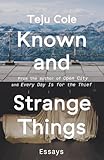 This first work of nonfiction by the Nigerian-American novelist best known for Open City collects more than 50 short essays touching on topics from Virginia Woolf and William Shakespeare to Instagram and the Black Lives Matter movement. In one essay, Cole, an art historian and photographer, looks at how African-American photographer Roy DeCarava, forced to shoot with film designed for white skin tones, depicted his black subjects. In another essay, Cole dissects “the White Savior Industrial Complex” that he says guides much of Western aid to African nations. (Michael)
This first work of nonfiction by the Nigerian-American novelist best known for Open City collects more than 50 short essays touching on topics from Virginia Woolf and William Shakespeare to Instagram and the Black Lives Matter movement. In one essay, Cole, an art historian and photographer, looks at how African-American photographer Roy DeCarava, forced to shoot with film designed for white skin tones, depicted his black subjects. In another essay, Cole dissects “the White Savior Industrial Complex” that he says guides much of Western aid to African nations. (Michael)
September
Born to Run by Bruce Springsteen:  After performing at halftime for the 2009 Super Bowl, the bard of New Jersey decided it was time to write his memoirs. This 500-page doorstopper covers Springsteen’s Catholic childhood, his early ambition to become a musician, his inspirations, and the formation of the E Street Band. Springsteen’s lyrics have always shown a gift for storytelling, so we’re guessing this is going to be a good read. (Hannah)
After performing at halftime for the 2009 Super Bowl, the bard of New Jersey decided it was time to write his memoirs. This 500-page doorstopper covers Springsteen’s Catholic childhood, his early ambition to become a musician, his inspirations, and the formation of the E Street Band. Springsteen’s lyrics have always shown a gift for storytelling, so we’re guessing this is going to be a good read. (Hannah)
Weapons of Math Destruction by Cathy O’Neil: 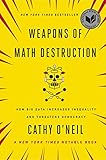 Big Data is everywhere, setting our insurance premiums, evaluating our job performance, and deciding whether we qualify for that special interest rate on our home loan. In theory, this should eliminate bias and make ours a better, fairer world, but in fact, says O’Neil, a former Wall Street data analyst, the algorithms that rule our lives can reinforce discrimination if they’re sloppily designed or improperly applied. O’Neil has a Ph.D. in math from Harvard, and runs the blog, mathbabe.org, where you can find answers to questions like “Why did the Brexit polls get it so wrong?” and why the data-driven policing program “Broken Windows” doesn’t work. (Michael)
Big Data is everywhere, setting our insurance premiums, evaluating our job performance, and deciding whether we qualify for that special interest rate on our home loan. In theory, this should eliminate bias and make ours a better, fairer world, but in fact, says O’Neil, a former Wall Street data analyst, the algorithms that rule our lives can reinforce discrimination if they’re sloppily designed or improperly applied. O’Neil has a Ph.D. in math from Harvard, and runs the blog, mathbabe.org, where you can find answers to questions like “Why did the Brexit polls get it so wrong?” and why the data-driven policing program “Broken Windows” doesn’t work. (Michael)
Words on the Move by John McWhorter: 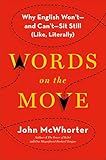 Does the way some people use the word “literally” drive you up the (metaphorical) wall? Before you, like, blow a gasket, try this book by a Columbia University professor who argues that we should embrace rather than condemn the natural evolution of the English language, whether it’s the use of “literally” to mean “figuratively” or the advent of business jargon like “What’s the ask?” If that’s not enough bracing talk about how we talk, in January 2017 McWhorter is releasing a second book, Talking Back, Talking Black, about African American Vernacular English. (Michael)
Does the way some people use the word “literally” drive you up the (metaphorical) wall? Before you, like, blow a gasket, try this book by a Columbia University professor who argues that we should embrace rather than condemn the natural evolution of the English language, whether it’s the use of “literally” to mean “figuratively” or the advent of business jargon like “What’s the ask?” If that’s not enough bracing talk about how we talk, in January 2017 McWhorter is releasing a second book, Talking Back, Talking Black, about African American Vernacular English. (Michael)
The Pigeon Tunnel by John le Carré:  The British intelligence officer turned bestselling spy novelist has written his first memoir, regaling readers with stories from his extraordinary writing career. A witness to great historical change in Europe and abroad, le Carré visited Russia before and after the fall of the Berlin Wall, and met many fascinating characters in his travels, including KGB officers, an imprisoned German terrorist, and a female aid worker who was the inspiration for the main character in The Constant Gardner. Le Carré also writes about watching Alec Guinness take on his most famous character, George Smiley. (Hannah)
The British intelligence officer turned bestselling spy novelist has written his first memoir, regaling readers with stories from his extraordinary writing career. A witness to great historical change in Europe and abroad, le Carré visited Russia before and after the fall of the Berlin Wall, and met many fascinating characters in his travels, including KGB officers, an imprisoned German terrorist, and a female aid worker who was the inspiration for the main character in The Constant Gardner. Le Carré also writes about watching Alec Guinness take on his most famous character, George Smiley. (Hannah)
Avid Reader: A Life by Robert Gottlieb: 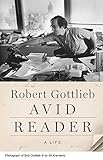 Legendary editor and dance aficionado Gottlieb has had a career that could fill several memoirs. He began at Simon & Schuster, where he quickly rose to the top, discovering American classics like Catch-22 along the way. He left Simon & Schuster to run Alfred A. Knopf, and later, to succeed William Shawn as editor of The New Yorker. Gottlieb has worked with some of the country’s most celebrated writers, including John Cheever, Toni Morrison, Shirley Jackson, and Robert Caro. (Hannah)
Legendary editor and dance aficionado Gottlieb has had a career that could fill several memoirs. He began at Simon & Schuster, where he quickly rose to the top, discovering American classics like Catch-22 along the way. He left Simon & Schuster to run Alfred A. Knopf, and later, to succeed William Shawn as editor of The New Yorker. Gottlieb has worked with some of the country’s most celebrated writers, including John Cheever, Toni Morrison, Shirley Jackson, and Robert Caro. (Hannah)
This Vast Southern Empire by Matthew Karp: 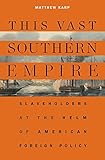 In the contemporary American mind, the Confederacy is recalled as a rump government of Southern plutocrats bent on protecting an increasingly outmoded form of chattel slavery, but as this new history reminds us, before the Civil War, many of the men who guided America’s foreign policy and territorial expansion were Southern slave owners. At the height of their power in antebellum Washington, Southern politicians like Vice President John C. Calhoun and U.S. Secretary of War Jefferson Davis modernized the U.S. military and protected slavery in Brazil, Cuba, and the Republic of Texas. (Michael)
In the contemporary American mind, the Confederacy is recalled as a rump government of Southern plutocrats bent on protecting an increasingly outmoded form of chattel slavery, but as this new history reminds us, before the Civil War, many of the men who guided America’s foreign policy and territorial expansion were Southern slave owners. At the height of their power in antebellum Washington, Southern politicians like Vice President John C. Calhoun and U.S. Secretary of War Jefferson Davis modernized the U.S. military and protected slavery in Brazil, Cuba, and the Republic of Texas. (Michael)
Shirley Jackson by Ruth Franklin: 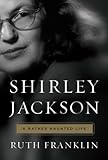 Shirley Jackson, best known for her bone-chilling and classic short story, “The Lottery,” has to be one of our most underrated novelists. Franklin describes Jackson’s fiction as “domestic horror,” a pioneering genre that explored women’s isolation in marriage and family life through the occult. Franklin’s biography has already been praised by Neil Gaiman, who wrote that it provides “a way of reading Jackson and her work that threads her into the weave of the world of words, as a writer and as a woman, rather than excludes her as an anomaly.” (Hannah)
Shirley Jackson, best known for her bone-chilling and classic short story, “The Lottery,” has to be one of our most underrated novelists. Franklin describes Jackson’s fiction as “domestic horror,” a pioneering genre that explored women’s isolation in marriage and family life through the occult. Franklin’s biography has already been praised by Neil Gaiman, who wrote that it provides “a way of reading Jackson and her work that threads her into the weave of the world of words, as a writer and as a woman, rather than excludes her as an anomaly.” (Hannah)
When in French by Lauren Collins:  New Yorker staffer Collins moved to London only to fall in love with a Frenchman. For years, the couple spoke to each another in English but Collins always wondered what she was missing by not communicating in her partner’s native tongue. When she and her husband moved to Geneva, Collins decided to learn French from the Swiss. When in French details Collins’s struggles to learn a new language in her 30s, as well as the joy of attaining a deeper understanding of French culture and people. (Hannah)
New Yorker staffer Collins moved to London only to fall in love with a Frenchman. For years, the couple spoke to each another in English but Collins always wondered what she was missing by not communicating in her partner’s native tongue. When she and her husband moved to Geneva, Collins decided to learn French from the Swiss. When in French details Collins’s struggles to learn a new language in her 30s, as well as the joy of attaining a deeper understanding of French culture and people. (Hannah)
Hidden Figures by Margot Lee Shetterly: 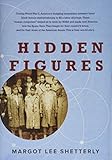 During the early Space Race years, female mathematicians known as “human computers” used slide rules and adding machines to make the calculations that launched rockets, and later astronauts, into space. Many of these women were black math teachers recruited from segregated schools in the South to fill spots in the aeronautics industry created by wartime labor shortages. Not surprisingly, Hidden Figures, which focuses on the all-black “West Computing” group at the Langley Memorial Aeronautical Laboratory, is being made into a movie starring Taraji Henson and Kevin Costner. (Michael)
During the early Space Race years, female mathematicians known as “human computers” used slide rules and adding machines to make the calculations that launched rockets, and later astronauts, into space. Many of these women were black math teachers recruited from segregated schools in the South to fill spots in the aeronautics industry created by wartime labor shortages. Not surprisingly, Hidden Figures, which focuses on the all-black “West Computing” group at the Langley Memorial Aeronautical Laboratory, is being made into a movie starring Taraji Henson and Kevin Costner. (Michael)
American Prophets by Albert J. Raboteau: 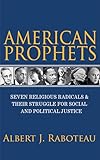 This fascinating social history profiles seven religious leaders whose collective efforts helped to fight war, racism, and poverty and bring about massive social change in midcentury America. It’s a list that includes Dr. Martin Luther King, Jr., as well as Abraham Joshua Heschel, A. J. Muste, Dorothy Day, Howard Thurman, Thomas Merton, and Fannie Lou Hamer. Raboteau finds new connections between these figures and delves into the ideas and theologies that inspired them. (Hannah)
This fascinating social history profiles seven religious leaders whose collective efforts helped to fight war, racism, and poverty and bring about massive social change in midcentury America. It’s a list that includes Dr. Martin Luther King, Jr., as well as Abraham Joshua Heschel, A. J. Muste, Dorothy Day, Howard Thurman, Thomas Merton, and Fannie Lou Hamer. Raboteau finds new connections between these figures and delves into the ideas and theologies that inspired them. (Hannah)
The Art of Waiting by Belle Boggs:  The title of this essay collection comes from Boggs’s much-shared Orion essay, which frankly depicted her despair as she realized that she might never conceive a child. What made the essay special was Boggs’s eye to the natural world, as she observed fertility and birth in the birds and animals near her rural home. Boggs continues to focus her gaze outward in these essays as she reports on families who have chosen to adopt, LBGT couples considering surrogacy and assisted reproduction, and the financial and legal complications accompanying these alternative means of fertility. (Hannah)
The title of this essay collection comes from Boggs’s much-shared Orion essay, which frankly depicted her despair as she realized that she might never conceive a child. What made the essay special was Boggs’s eye to the natural world, as she observed fertility and birth in the birds and animals near her rural home. Boggs continues to focus her gaze outward in these essays as she reports on families who have chosen to adopt, LBGT couples considering surrogacy and assisted reproduction, and the financial and legal complications accompanying these alternative means of fertility. (Hannah)
Time Travel: A History by James Gleick: 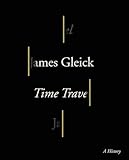 The tech-savvy author of The Information and Chaos shows how time travel as a literary conceit is intimately intertwined with the modern understanding of time that arose from technological innovations like the telegraph, train travel, and advances in clock-making. Beginning with H.G. Wells, author of The Time Machine, Gleick tracks the evolution of time travel as a cultural construct from the novels of Marcel Proust to the cult British TV show Doctor Who. (Michael)
The tech-savvy author of The Information and Chaos shows how time travel as a literary conceit is intimately intertwined with the modern understanding of time that arose from technological innovations like the telegraph, train travel, and advances in clock-making. Beginning with H.G. Wells, author of The Time Machine, Gleick tracks the evolution of time travel as a cultural construct from the novels of Marcel Proust to the cult British TV show Doctor Who. (Michael)
Strangers in Their Own Land by Arlie Russell Hochschild: 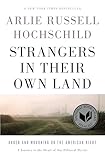 Perfectly timed for the start of the last lap of the presidential campaign, this book endeavors to see red-state voters as they see themselves — not as dupes of right-wing media, but as ordinary, patriotic Americans trying to do the best for their families and themselves. A renowned sociologist and author of The Second Shift, a classic 1989 study of women’s roles in working families, Hochschild ventures far from her home in uber-liberal Berkeley, Calif., to meet hardcore conservatives in southern Louisiana. There, as in so much of working-class America, she finds lives riven by stagnant wages, the loss of homes, and an exhausting chase after an ever-elusive American dream. (Michael)
Perfectly timed for the start of the last lap of the presidential campaign, this book endeavors to see red-state voters as they see themselves — not as dupes of right-wing media, but as ordinary, patriotic Americans trying to do the best for their families and themselves. A renowned sociologist and author of The Second Shift, a classic 1989 study of women’s roles in working families, Hochschild ventures far from her home in uber-liberal Berkeley, Calif., to meet hardcore conservatives in southern Louisiana. There, as in so much of working-class America, she finds lives riven by stagnant wages, the loss of homes, and an exhausting chase after an ever-elusive American dream. (Michael)
Eyes on the Street by Robert Kanigel: 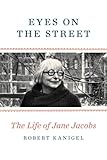 Anyone who has window-shopped in SoHo or marveled at the walkability of their neighborhood can thank activist Jane Jacobs who forever changed how planners thought about and designed urban spaces with her landmark 1961 book The Death and Life of Great American Cities. Kanigel, author of The Man Who Knew Infinity, traces the roots of the great urban pioneer who wrote seven books and stopped New York’s all-powerful planning czar Robert Moses from running a major highway through Lower Manhattan, all without a college degree. (Michael)
Anyone who has window-shopped in SoHo or marveled at the walkability of their neighborhood can thank activist Jane Jacobs who forever changed how planners thought about and designed urban spaces with her landmark 1961 book The Death and Life of Great American Cities. Kanigel, author of The Man Who Knew Infinity, traces the roots of the great urban pioneer who wrote seven books and stopped New York’s all-powerful planning czar Robert Moses from running a major highway through Lower Manhattan, all without a college degree. (Michael)
October
Love for Sale by David Hajdu: 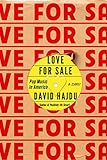 In his previous books, Hajdu has written about jazz and folk music; in Love for Sale he tells the story of American popular music from its vaudeville beginnings to Blondie at CBGB to today’s electronic dance music. Hajdu highlights overlooked performers like blues singer Bessie Smith and Jimmie Rodgers, a country singer who incorporated yodeling into his music. (Hannah)
In his previous books, Hajdu has written about jazz and folk music; in Love for Sale he tells the story of American popular music from its vaudeville beginnings to Blondie at CBGB to today’s electronic dance music. Hajdu highlights overlooked performers like blues singer Bessie Smith and Jimmie Rodgers, a country singer who incorporated yodeling into his music. (Hannah)
Future Sex by Emily Witt: 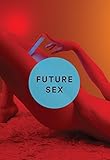 In her first book, journalist and critic Witt writes about the intersection between sex and technology, otherwise known as online dating. Witt reports on internet pornography, polyamory, and other sexual subcultures, giving an honest and open-minded account of how people pursue pleasure and connection in a changing sexual landscape. (Hannah)
In her first book, journalist and critic Witt writes about the intersection between sex and technology, otherwise known as online dating. Witt reports on internet pornography, polyamory, and other sexual subcultures, giving an honest and open-minded account of how people pursue pleasure and connection in a changing sexual landscape. (Hannah)
Hungry Heart by Jennifer Weiner: 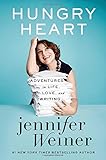 No, it’s not the second volume of Springsteen’s memoirs — instead, it’s an essay collection from a bestselling author who may be as famous for her defense of chick-lit as she is for her own female-centric novels. This is Weiner’s first volume of nonfiction, and she has a lifetime of topics to cover: growing up as an outsider in her picture-perfect town, her early years as a newspaper reporter, finding her voice as a novelist, becoming a mother, the death of her estranged father, and what it felt like to hear her daughter use the “f-word” — “fat” — for the first time. (Hannah)
No, it’s not the second volume of Springsteen’s memoirs — instead, it’s an essay collection from a bestselling author who may be as famous for her defense of chick-lit as she is for her own female-centric novels. This is Weiner’s first volume of nonfiction, and she has a lifetime of topics to cover: growing up as an outsider in her picture-perfect town, her early years as a newspaper reporter, finding her voice as a novelist, becoming a mother, the death of her estranged father, and what it felt like to hear her daughter use the “f-word” — “fat” — for the first time. (Hannah)
Truevine by Beth Macy: 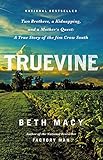 One day in 1899, a white man offered a piece of candy to George and Willie Muse, the children of black sharecroppers in Truevine, Va., setting off a chain of events that led to the boys being kidnapped into a circus, which billed them as cannibals and “Ambassadors from Mars” in tours that played for royalty at Buckingham Palace and in sold-out shows at Madison Square Garden. Like Macy’s last book, Factory Man, about a good-old-boy owner of a local furniture factory in Virginia who took on low-cost Chinese exporters and won, Truevine promises a mix of quirky characters, propulsive narrative, and an insider’s look at a neglected corner of American history. (Michael)
One day in 1899, a white man offered a piece of candy to George and Willie Muse, the children of black sharecroppers in Truevine, Va., setting off a chain of events that led to the boys being kidnapped into a circus, which billed them as cannibals and “Ambassadors from Mars” in tours that played for royalty at Buckingham Palace and in sold-out shows at Madison Square Garden. Like Macy’s last book, Factory Man, about a good-old-boy owner of a local furniture factory in Virginia who took on low-cost Chinese exporters and won, Truevine promises a mix of quirky characters, propulsive narrative, and an insider’s look at a neglected corner of American history. (Michael)
Upstream by Mary Oliver:  Essays from one of America’s most beloved poets. As always, Oliver’s draws inspiration from the natural world, and Provincetown, Mass., her home and life-long muse. Oliver also writes about her early love of Walt Whitman, the labor of poetry, and the continuing influence of classic American writers such as Robert Frost, Edgar Allan Poe, and Ralph Waldo Emerson. (Hannah)
Essays from one of America’s most beloved poets. As always, Oliver’s draws inspiration from the natural world, and Provincetown, Mass., her home and life-long muse. Oliver also writes about her early love of Walt Whitman, the labor of poetry, and the continuing influence of classic American writers such as Robert Frost, Edgar Allan Poe, and Ralph Waldo Emerson. (Hannah)
Black Elk by Joe Jackson: A biography of a Native American holy man whose epic life spanned a dramatic era in the history of the American West. In his youth, Black Elk fought in Little Big Horn, witnessed the death of his second cousin, Crazy Horse, and traveled to Europe to perform in Buffalo Bill’s Wild West Show. In later years, he fought in Wounded Knee, became an activist for the Lakota people, and converted to Catholicism. Known to many through his spiritual testimony, Black Elk Speaks, this biography brings the man to life, as well as the turbulent times he lived through. (Hannah)
November
Born a Crime by Trevor Noah: As the child of a white Dutch father and a black Xhosa mother who had to pretend she was her own child’s nanny on the rare occasions the family was together, comedian Noah’s very existence was evidence of a crime under the apartheid laws of his native South Africa. In his memoir, Noah recalls eating caterpillars to stave off hunger and being thrown by his eccentric mother from a speeding car driven by murderous gangsters. If you survived a childhood like that, you might not be so intimated at the prospect of replacing Jon Stewart on The Daily Show, either. (Michael)
My Lost Poets by Philip Levine:  In this posthumous essay collection from one of our pre-eminent poets, Levine writes about composing poems as a child, studying with John Berryman, the influence of Spanish poets on his work, his idols and mentors, and his many inspirations: jazz, Spain, Detroit, and masters of the form like William Wordsworth and John Keats. (Hannah)
In this posthumous essay collection from one of our pre-eminent poets, Levine writes about composing poems as a child, studying with John Berryman, the influence of Spanish poets on his work, his idols and mentors, and his many inspirations: jazz, Spain, Detroit, and masters of the form like William Wordsworth and John Keats. (Hannah)
Writing to Save a Life by John Edgar Wideman:  Ten years before Emmett Till was brutally lynched for supposedly whistling at a white woman in Mississippi, his father Louis was executed by the U.S. army for rape and murder. Wideman, who was the same age as Emmett Till, just 14, the year he was murdered, mixes memoir and historical research in his exploration of the eerily twinned executions of the two Till men. A Rhodes Scholar and MacArthur “genius grant” recipient, Wideman knows all too well what it means to have a close relative accused of a violent crime: his son, Jacob, and his brother, Robert, were both convicted of murder. (Michael)
Ten years before Emmett Till was brutally lynched for supposedly whistling at a white woman in Mississippi, his father Louis was executed by the U.S. army for rape and murder. Wideman, who was the same age as Emmett Till, just 14, the year he was murdered, mixes memoir and historical research in his exploration of the eerily twinned executions of the two Till men. A Rhodes Scholar and MacArthur “genius grant” recipient, Wideman knows all too well what it means to have a close relative accused of a violent crime: his son, Jacob, and his brother, Robert, were both convicted of murder. (Michael)
Searching for John Hughes by Jason Diamond: 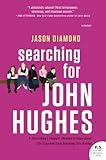 Diamond has established himself as an authority on/gently obsessive superfan of John Hughes with pieces on the filmmaker for Buzzfeed and The Atlantic (from where I learned the shameful fact that John Hughes was responsible for the movie Flubber in addition to his suite of beloved suburban-white-kid films). Diamond’s Hughes interest stretches back to his time as an aspiring, and doomed, Hughes biographer. Diamond commemorates this journey through a memoir and cultural history of a brief, vanished moment in the Chicagoland suburbs. (Lydia)
Diamond has established himself as an authority on/gently obsessive superfan of John Hughes with pieces on the filmmaker for Buzzfeed and The Atlantic (from where I learned the shameful fact that John Hughes was responsible for the movie Flubber in addition to his suite of beloved suburban-white-kid films). Diamond’s Hughes interest stretches back to his time as an aspiring, and doomed, Hughes biographer. Diamond commemorates this journey through a memoir and cultural history of a brief, vanished moment in the Chicagoland suburbs. (Lydia)
December
The Undoing Project by Michael Lewis:  Why do people go with their guts, even when their guts so often steer them wrong? Lewis stumbled onto this fundamental human question in his bestselling 2003 book Moneyball, about how the Oakland A’s, a cash-strapped major league team, used data analysis to beat wealthier teams. A brief reference in a review of Moneyball in The New Republic led Lewis to two psychologists, Daniel Kahneman and Amos Tversky, whose work explores why humans follow their intuition. If Kahneman’s name sounds familiar, that’s because he’s a Nobel laureate and author of the 2011 bestseller Thinking Fast and Slow. That’s a lot of bestseller cred in one book. (Michael)
Why do people go with their guts, even when their guts so often steer them wrong? Lewis stumbled onto this fundamental human question in his bestselling 2003 book Moneyball, about how the Oakland A’s, a cash-strapped major league team, used data analysis to beat wealthier teams. A brief reference in a review of Moneyball in The New Republic led Lewis to two psychologists, Daniel Kahneman and Amos Tversky, whose work explores why humans follow their intuition. If Kahneman’s name sounds familiar, that’s because he’s a Nobel laureate and author of the 2011 bestseller Thinking Fast and Slow. That’s a lot of bestseller cred in one book. (Michael)
And Beyond
To Be a Machine by Mark O’Connell: In his first full-length book, due out in March 2017, longtime Millions staff writer O’Connell offers an inside look at the “transhumanism movement,” the adherents of which hope to one day “solve” the problem of death and use technology to propel human evolution. If O’Connell’s pieces for this site and his ebook, Epic Fail: Bad Art, Viral Fame, and the History of the Worst Thing Ever, published by The Millions in 2013, are any guide, To Be a Machine will be smart and odd and very, very funny. (Michael)
Abandon Me by Melissa Febos:  Following on the success of her debut memoir, Whip Smart, about her years as a professional dominatrix and junkie, Febos turns back the clock to examine her relationship with her birth father, whose legacy includes his Native American heritage and a tendency toward addiction. Interwoven with these family investigations is the story of Febos’s passionate long-distance love affair with another woman. Abandon Me is slated for February 2017. (Michael)
Following on the success of her debut memoir, Whip Smart, about her years as a professional dominatrix and junkie, Febos turns back the clock to examine her relationship with her birth father, whose legacy includes his Native American heritage and a tendency toward addiction. Interwoven with these family investigations is the story of Febos’s passionate long-distance love affair with another woman. Abandon Me is slated for February 2017. (Michael)
Lower Ed by Tressie McMillan Cottom:  A much-needed examination of the recent expansion of for-profit universities, which have put millions of young people into serious debt at the beginning of their careers. Cottom links the rise of for-profit universities to rising inequality, drawing on her own experience as an admissions counselor at two for-profit universities, and interviewing students, activists, and senior executives in the industry. (Hannah)
A much-needed examination of the recent expansion of for-profit universities, which have put millions of young people into serious debt at the beginning of their careers. Cottom links the rise of for-profit universities to rising inequality, drawing on her own experience as an admissions counselor at two for-profit universities, and interviewing students, activists, and senior executives in the industry. (Hannah)
Hunger by Roxane Gay: In our spring nonfiction preview, we looked forward to Gay’s memoir Hunger, which was slated to be published in June 2016, but her publishing date has been pushed back to June 2017. According to reporting from EW, and Gay’s own tweets, the book simply took longer than Gay expected. She also wanted its release to follow a book of short stories, Difficult Women, which will be published in January 2017. (Hannah)
And Now We Have Everything by Meaghan O’Connell: Millions Year in Reading alum and New York magazine’s The Cut columnist O’Connell will bring her signature voice to a collection of essays about motherhood billed as “this generation’s Operating Instructions.” Readers who follow O’Connell’s writing for The Cut or her newsletter look forward to a full volume of her relatable, sometimes mordant, sometimes tender reflections on writing and family life. (Lydia)








